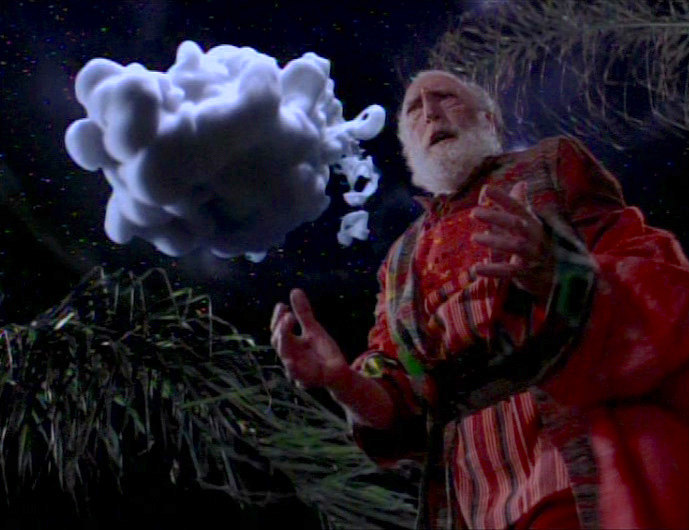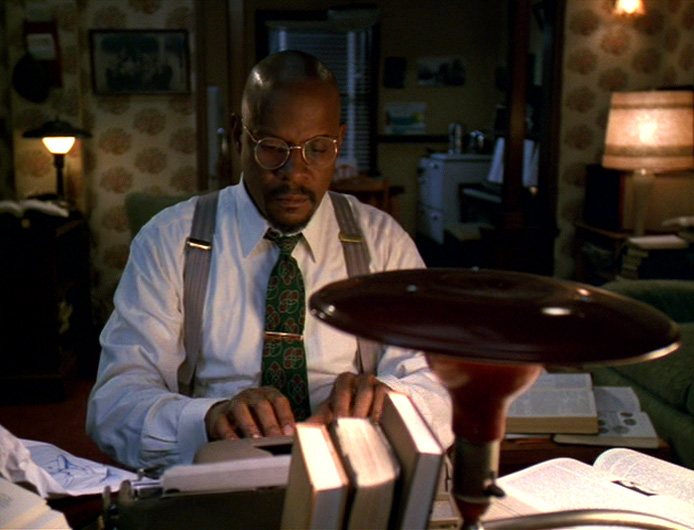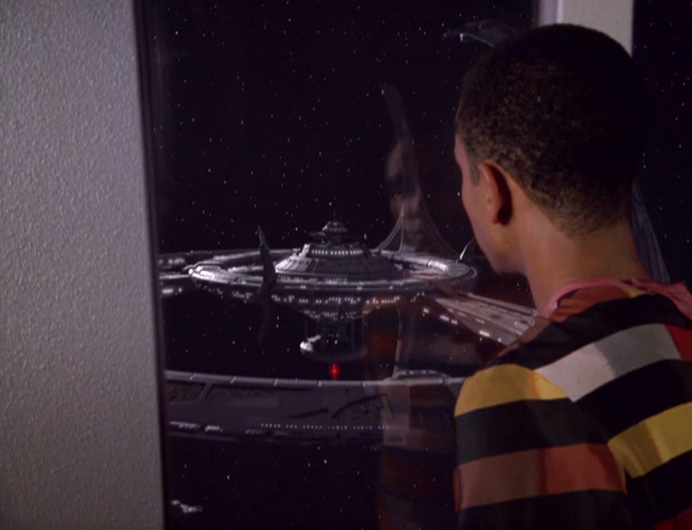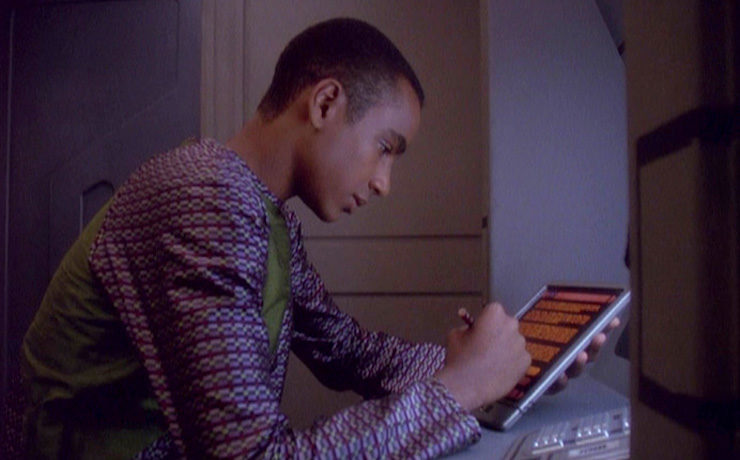The 24th anniversary of the first episode of Star Trek: Deep Space 9 took place earlier this month. The series took a lot of risks with the “idealized future” of Roddenberry as written into Star Trek’s DNA, adding nuance to Starfleet ideals by incorporating human desires and failings into the narrative. Some praised it for being more real, more relatable; some criticized it for being “too dark” and showing Starfleet in a bad light.
One thing I enjoyed was that in the midst of the Star Trek Universe’s science-and-tech-centric STEM paradise, DS9 showrunners made the captain’s son, Jake Sisko, a writer. We science fiction writers love our astronauts and engineers, but I was thrilled to see 14-year-old Jake developing into a writer and storyteller. They gave him a familiar writer’s journey: he dabbled in poetry, moved into short stories, then novels, and along the way he became a journalist, a war correspondent (echoes of Hemingway and Crane), and published a collection of essays about living under Dominion occupation, as well as a semi-autobiographical novel. By committing to Jake’s arc through the whole series, DS9 brought into broader relief how the series honoured storytellers.
Storytellers

For me, the whole series rests on the inherent conflict of a storytelling people who have been occupied and oppressed, and who fear they will not be allowed to live by and embrace their stories again. Even as they hated the Cardassian occupation, they fear a Starfleet science-first “occupation” will destroy their cultural identity before they are able to recover a sense of stability.
DS9 is very careful to respect Bajoran beliefs and stories. The belief in the importance of cultural perspectives–bound up in a culture’s stories–permeates the show. Aspects of alien culture are learned and interpreted through their literature–the characters discuss Cardassian novels, Klingon poetry, Bajoran scriptures, and the Ferengi Rules of Acquisition as ways to understand each other.
DS9 presents the radical idea that we understand each other through our cultural stories. This is why, I think, DS9’s decision to focus on Jake’s development as a writer is such an interesting idea. In the Star Trek universe, we have always been led to believe that a career in Starfleet was the highest ideal to which an intelligent being could aspire. Look how often new species took the uniform. Or how many times it’s been demonstrated that science and technology solve everything. But Jake would rather focus on trying to understand his characters, on language and moving words around, than get to work fixing upper pylon #6. One starts to wonder if maybe there’s a purpose for a writer in a 24th Century so fascinated with its own amazing technology—can professional artists be as important to our future as Starfleet?
Far Beyond the Stars

“Far Beyond the Stars” is DS9’s strongest statement about writing, and highlights the writer’s journey Jake Sisko’s been on.
The episode tells of science fiction writers in the 1950s attempting to create stories that would help imagine a better life for those limited by society. Benjamin Sisko appears as a black writer named Benny Russell struggling to create a story in which he is represented, far in the future–to create a Ben Sisko that is a captain of a space station–and he is thwarted by society’s prejudice (and that of his publishers) when the issues containing his stories are pulped before they can be read by the public.
This episode works as a key for understanding Star Trek as an entire phenomenon.
Metafictionally, it suggests that we, too, are a storytelling culture trying to create stories that imagine a better life for those limited by society. Star Trek is our way of trying to create a blueprint for the future. By casting Ben Sisko as Benny Russell in the 1950s, the show forges a clear link between Star Trek (the series) and minority writers struggling to envision the future for themselves.
Jake Sisko and Benny Russell are both urban writers in the mold not so much of Hemingway and Crane but of Samuel R. Delany, Richard Wright, Langston Hughes, James Baldwin, and Ralph Ellison—artists trying to envision a future, trying to illuminate the present, talking about life under the Occupation, telling their stories.
The ripples of the past portrayed in this episode lead inexorably toward all the struggling competing voices of the DS9 storytellers (Bajoran religious storytellers, Cardassian politicians, Klingon Poets) who are trying to envision themselves into better places.
Writing the Future

The preacher in “Far Beyond the Stars” exhorts Benny to “Write those words! Let them see the glory of what lies ahead!”
DS9 knew that what Star Trek has always done best is provide a model for how we could be—and lets us hope that we’re moving in the right direction. DS9 understood that Star Trek itself is an ongoing struggle to envision a better future…the kind of future that Martin Luther King believed in enough that he asked Nichelle Nichols to stay in a role she initially found limiting. Science Fiction can be our dream of a better future for all races, all nationalities, for people of color, the LGBTQ community, women, the differently-abled, for the economically disadvantaged, for all of us–we can craft that future.
The place for writers in the future is in the lead–as Visionaries, Historians, Critics, Memoirists–telling our stories so that humanity can work together with compassion and understanding–even in the 24th Century.
Writers are the STEM jobs of a culture: they tell us how a culture works.
We need them.
Because even in our spaceships of the future, DS9 knew we were still going to be made up of different cultures, living and working together, hoping to be understood. Writers like you and me and Jake Sisko will be chronicling and giving expression to all the voices, and learning how we can best fit together on a path to new worlds.
Jerome Stueart is the author of a collection of stories, published by ChiZine, The Angels of Our Better Beasts. He lived and worked in Canada’s Yukon Territory, but now teaches writing, doodles beasts, looks for bears, and lives in Dayton, Ohio.











The funny thing I was completely opposite. Writing is incredibly common vocation of on screen characters – every other story is about how the character wants be a writer and write an ultimate novel (usually American one) or about writer’s block for the second one or life as an English teacher when you failed to write it or finding that life experience that lets him finally get published. If yo watch films it sometimes feels like the only thing one would ever want to be is a writer (people do pick science or tech not because we were forced by parents but because we like it). Or if they’re more adventurous a journalist. From Gilmore Girls to Shining to Limitless the writers are everywhere. It’s figures since the screenwriters are writers and they are basically writing ultimate insert fic but still when I saw who Jake wanted to be my main reaction was – “oh, gods, not another one” (even in my space adventure).
Jerome, that was magnificent! Especially in these uncertain days, these are words we need to hear!
I still tell people that if I could be anything in the world(without regard to compensation/survival!), I’d be a writer. Oh how I wish this was an area where my talents mirrored my desire! I do so love writing, but poetry/short-form-fiction doesn’t pay the rent very well. (Or at all)
Sorry Jerome but there are only three upper pylons on DS9, but there are six pylons altogether.
I would have been more impressed if the DS9 writers had made Jake interested in science, or medicine, or music. But they made him just like them.
The problem I had with “Far Beyond the Stars” is that SF was shown as a Guys Only Club, with Kira playing the secretary–in the real SF world of that era, Kira would have been “Andre Norton”. But alas…
Um, I’m pretty sure Kira played one of the writers, and Dax played the secretary. The editor told Kira to stay home on picture day.
i think the choice to make Jake a writer in DS9 felt different to me than all the other times I’d watched movies or shows with writers in them. In Star Trek we seemed to have evolved beyond writers being an integral part of our society—the crew of any starship never watch movies, or form book clubs. When Picard started reading it was on a pad and then gradually he moved to leather bound books to show he was reading books. I wondered what the place of authors were in a tech-oriented society. Yes, Voyager played with the idea of two characters “writing” holonovels, and Neelix wandering through an interactive children’s book with his godniece. But I felt like my question was valid in a STEM driven culture (and true we really only see exploratory starships, not the Earth culture back on Earth) but in that STEM driven environment, I thought it was a unique choice to make Jake a writer. While it is common now for people to aspire to be writers–would it be common then? And my favorite Star Trek Episode involves Jake as an older writer–the voices of people still valid and needed in our future cultures. That was very reassuring. So, for me, it didn’t seem like a lazy choice to make Jake a writer—in a Star Trek universe it felt like boldly going where we hadn’t been before.
@8/Jerome Stueart: Star Trek has always displayed a fondness for art and literature. Kirk quoting poetry. Picard quoting Shakespeare. Data painting and writing poems. “Requiem for Methuselah”. “When the Bough Breaks”. Music, too – there’s Uhura singing, Spock’s harp, Riker’s trombone, Picard’s flute,…
I agree, Jana. They do value the arts. Great discussion! But i wonder–in each case of star fleet personnel–it is a hobby. Not a profession. I’m glad Riker can play the trombone and Harry Kim the clarinet. Great that Spock can play the lute. But they are all hobbies of officers, and I just see Jake as a different validation of the arts: The arts as profession for a recurring cast member. In the same way that Deanna Troi was possibly a validation for psychology and counseling as a science and a valued profession one could go into, Jake seems to be Star Trek validating writing as a profession.
@10/Jerome: You’re right, making Jake a writer takes the appreciation of the arts to a new level. I wasn’t sure what to think of it at first, because usually I agree with comment #1 – writers write about writers too much – but it isn’t the same thing here.
It also shows respect for young people and their choices. That’s a good thing too.